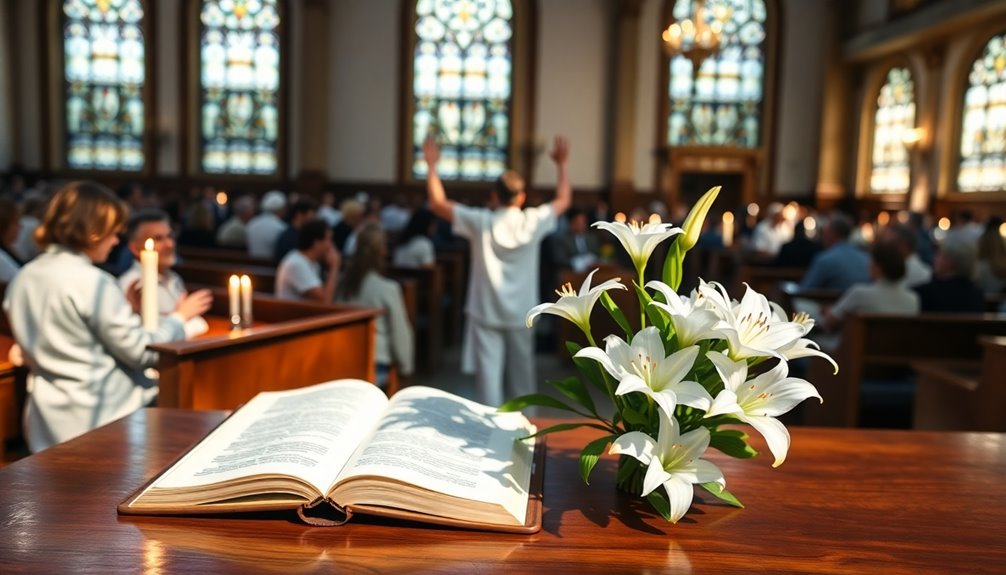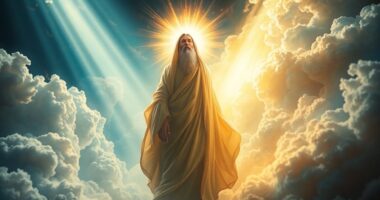Easter Sunday is a major Christian holiday where you celebrate the resurrection of Jesus Christ. It's observed on the first Sunday after the first full moon following the vernal equinox, usually between March 22 and April 25. This day culminates Holy Week and is filled with meaningful traditions, including special church services and joyful community activities. The date also connects to the Jewish Passover, symbolizing renewal and new beginnings. With vibrant celebrations and rituals like egg decorating, Easter brings people together. To uncover more about the rich history and traditions tied to this day, you won't want to stop here.
Key Takeaways
- Easter Sunday celebrates the resurrection of Jesus Christ, marking His victory over death and sin.
- Established by the Council of Nicaea in 325 AD, Easter is a moveable feast determined by the Paschal full moon.
- The holiday culminates Holy Week, which includes significant days like Palm Sunday, Maundy Thursday, and Good Friday.
- Cultural traditions associated with Easter, such as egg decorating and the Easter Bunny, symbolize new life and springtime renewal.
- Easter encourages community outreach, with many participating in volunteer activities like food drives and family-friendly events.
Introduction

Easter Sunday is a significant event in the Christian calendar, marking the resurrection of Jesus Christ from the dead. This celebration occurs on the first Sunday after the first full moon following the vernal equinox, typically between March 22 and April 25.
Rooted in early Christian traditions, Easter connects deeply to the Jewish Passover and the narrative surrounding Jesus' crucifixion and resurrection around c.30 AD.
Easter Sunday serves as the culmination of Holy Week, which includes important observances such as Palm Sunday, Maundy Thursday, and Good Friday. The Council of Nicaea in 325 AD established the formula for determining Easter's date, ensuring it remains a moveable feast within the Christian liturgical calendar.
On this day, many Christians gather for church services, celebrating the joy of Jesus' resurrection. The festivities often extend beyond religious observance, incorporating cultural elements like Easter egg hunts and the Easter Bunny.
These traditions symbolize new life and rebirth, making Easter a rich blend of spiritual significance and community engagement. You can see how Easter Sunday not only commemorates a profound religious event but also fosters a sense of joy and togetherness among people.
Easter Resurrection Scriptures

When you explore Easter Resurrection Scriptures, you'll find powerful accounts in the Gospels that detail Jesus' resurrection.
Key verses highlight not only His victory over death but also the new life offered to believers.
Let's look at both primary and secondary references that underscore this cornerstone of Christian faith.
Primary Bible References
The resurrection of Jesus Christ is central to the celebration of Easter Sunday, with several key Bible verses detailing this pivotal event. In the New Testament, Matthew 28:1-10 describes the moment Mary Magdalene discovers the empty tomb, where an angel announces, "He is risen!" This declaration marks the beginning of your understanding of Jesus from the dead.
In Mark 16:6, the angel reinforces this message, saying, "He isn't here," emphasizing the triumphant victory over death.
Luke 24:6-7 elaborates on this by reminding the women that Jesus had foretold His resurrection, highlighting its significance in Christian faith.
The personal encounter between Jesus and Mary Magdalene in John 20:11-18 further confirms His resurrection, with Jesus instructing her to share the good news with His disciples.
These passages not only celebrate the resurrection of Jesus Christ but also affirm the foundational beliefs of Christianity regarding salvation and eternal life.
Through these scriptures, you grasp the profound impact of Easter Sunday, recognizing it as a day of hope and renewal in the light of Jesus's resurrection.
Secondary Bible References
Building on the primary accounts of Jesus' resurrection, secondary Bible references further enrich the understanding of this pivotal event. Easter Sunday serves as a celebration of the Resurrection of Jesus, as depicted in various New Testament scriptures.
In Romans 6:4, you see how baptism symbolizes the new life believers receive through the resurrection, highlighting the transformative power of Christ's victory over sin and death.
Additionally, 1 Corinthians 15:20-22 presents Jesus as the "firstfruits" of those who've died, affirming a promise of resurrection for all believers. This scripture reassures you that just as Christ rose, so too will those who place their faith in Him.
These passages not only reinforce the historical significance of the resurrection but also provide hope through the resurrection for countless believers.
As you reflect on Easter Sunday, consider how these secondary references deepen your understanding and appreciation of what Jesus accomplished. They invite you to embrace the life-changing implications of His resurrection and encourage you to share this profound hope with others.
Ancient Spring Fertility Rituals

Celebrating the arrival of spring, ancient cultures engaged in fertility rituals that marked the renewal of life and the flourishing of the land. These ancient spring fertility rituals often coincided with the spring equinox, a time when people honored deities associated with agriculture and fertility.
Eggs, symbols of new life, became central to these celebrations, representing growth and fresh beginnings.
As time went on, these pagan traditions blended with Christian customs, leading to what we now recognize as Easter. Today, Easter is the joyful celebration that commemorates the Resurrection, but it also retains echoes of those ancient rituals.
The practice of decorating colored eggs and the appearance of the Easter Bunny are remnants of those early spring festivals, reflecting humanity's deep connection to the cycles of nature.
In essence, Easter encapsulates the renewal of life, drawing from centuries of traditions that celebrate fertility and abundance.
By participating in these customs, you honor both the past and the present, embracing the spirit of new life that springs forth each year.
Cultural Significance of Easter

Easter Sunday holds profound cultural significance, serving as a vibrant intersection of faith, tradition, and community celebration. As you participate in the Easter celebration, you experience the essence of Resurrection Sunday, marking the resurrection of Jesus Christ and the themes of hope and renewal. Many gather for sunrise services, where the religious significance of this Christian holiday comes alive through special liturgies and communal worship.
Cultural traditions like Easter egg hunts and the appearance of the Easter Bunny add layers of joy to the day. These customs reflect a fascinating blend of Christian observance and ancient spring fertility rituals, illustrating how diverse interpretations of Easter have emerged over time.
The arrival of spring symbolizes new beginnings, and you may find yourself surrounded by vibrant displays of flowers and seasonal foods that showcase regional variations in celebration.
As you engage in these festivities, you're reminded of the unity and diversity within communities as they come together to honor this significant day. In the end, Easter isn't just a religious observance; it's a celebration of life, renewal, and the rich tapestry of cultural traditions that enrich our shared experience.
Easter's Connection to Passover

When you explore Easter's connection to Passover, you'll find that these two observances share profound historical roots.
Many mistakenly associate Easter with pagan traditions, but the timing and significance are deeply intertwined with Jewish customs.
Debunk Easter's Pagan Associations
Understanding the deep connections between Easter and Passover can help dispel the myth of Easter's pagan origins. Easter is celebrated as a Christian celebration of the resurrection of Jesus, directly linked to the Jewish Passover. The Last Supper, where Jesus broke bread with His disciples, is understood to be a Passover meal, emphasizing the connection between Jesus' death and the Passover narrative.
The timing of Easter is also derived from this relationship; it falls on the first Sunday after the first full moon following the vernal equinox. This method, established by the Council of Nicaea in 325 AD, reinforces the observance of Easter as a continuation of Passover traditions.
Early Christians viewed Jesus as the ultimate Passover lamb, fulfilling the sacrifice outlined in Jewish tradition. While some secular traditions, like the name "Easter," may have roots in Eostre, the core significance remains a celebration of resurrection and redemption.
Historical Accuracy of Sources
The historical accuracy of sources regarding Easter's connection to Passover reveals significant insights into the origins of this Christian celebration.
Easter Sunday, recognized as the day of the Resurrection of Jesus, closely aligns with the Jewish Passover. The Last Supper, where Jesus foreshadowed his resurrection, is believed to have been a Passover meal, indicating a clear link between the two events.
Early Christians intentionally aligned the celebration of Easter with Passover. By the mid-2nd century, this led to the establishment of Pascha, a distinct Christian festival.
The Apostle Paul reinforced this connection by referring to Jesus as the Passover lamb, highlighting that Christ from the dead fulfills the symbolic role of the lamb in the Exodus narrative.
The timing of Easter is also significant. It's determined by the Paschal full moon, which corresponds to the Jewish calendar, further solidifying its relationship with Passover.
In 325 AD, the Council of Nicaea standardized the method for calculating Easter's date, resolving early disputes and reinforcing its association with the Jewish Passover.
This historical context enriches your understanding of the celebration of Easter today.
Easter Service Volunteer Opportunities

Easter Sunday is a perfect time to get involved in your community through volunteer opportunities.
You can help local charities and participate in community outreach programs that provide meals and support to those in need.
Whether it's organizing an Easter event or lending a hand at a service, your contributions can make a real difference.
Volunteer for Local Charities
Volunteering for local charities on Easter Sunday offers a rewarding way to give back to your community. Many local charities and churches seek your help for community service projects, including organizing food drives and distributing meals to those in need.
You can find volunteer opportunities that involve participating in Easter activities like egg hunts, setting up and serving at community meals, or assisting with special church services and events.
These roles not only provide much-needed assistance but also allow you to connect with others and foster a sense of community. Local organizations often provide training or orientation sessions to prepare you for your role, ensuring you feel confident in delivering meaningful support to families facing challenges during the holiday season.
To get involved, check community bulletin boards, church announcements, or local charity websites for available opportunities. Keep in mind that due to high demand, early sign-up is often required.
Community Easter Outreach Programs
Community Easter outreach programs offer numerous opportunities for individuals to engage in service during this meaningful season. By participating, you can help foster a spirit of giving and connection within your community.
Many churches organize volunteer opportunities for their members to serve in local shelters, food banks, or community centers, making a real impact during Easter.
You might find yourself helping with Easter egg hunts and family-friendly events, where volunteers set up, supervise activities, and distribute treats, creating a joyful celebration for everyone.
During Easter services, your role could include greeting attendees, assisting with children's activities, or supporting logistics for special services like the Easter Vigil or sunrise services.
Outreach efforts often extend to organizing donation drives for food, clothing, or Easter baskets for families in need. Your congregation might encourage you to contribute items or volunteer your time, reinforcing the church's mission to serve the community.
Participation in these outreach programs not only enriches your faith through acts of service, but it also strengthens the bonds within your community during this significant season.
Embrace the chance to make a difference this Easter!
Easter's Impact on Community Unity

The celebration of Easter Sunday often acts as a catalyst for unity, bringing together families, friends, and neighbors in a shared experience of joy and reflection. This special day serves as a pivotal event for many communities, fostering connections through church services and family gatherings.
As you participate in local festivities, you witness how these traditions encourage cooperation and support among congregants and residents.
Easter's themes of renewal and rebirth inspire community outreach initiatives like food drives and charity events. These acts of volunteerism not only provide essential help to those in need but also reinforce the spirit of solidarity among participants.
You may find yourself joining in Easter egg hunts and parades, where collaboration among community members strengthens bonds and creates a festive atmosphere that promotes social interaction.
Moreover, the celebration of Easter across diverse cultures highlights the various ways communities express their faith and traditions. This shared experience fosters intercultural understanding, allowing you to appreciate the richness of different customs while uniting under the common goal of compassion and support.
In this way, Easter Sunday truly embodies the essence of community unity.
Additional Resources

Easter Sunday offers a wealth of resources to deepen your understanding and appreciation of this significant holiday. As you explore the celebration of the resurrection of Jesus, you'll find numerous materials that highlight its importance in Christian faith.
Many Christian churches provide special Easter services, including the traditional Easter Vigil on Holy Saturday, which marks the transition to Easter celebrations.
To enhance your Easter reflection, consider visiting various Christian websites that offer articles, prayers, and activities focused on the themes of new life and resurrection. These resources can help you engage with the holiday's spiritual significance more deeply.
You might also find guides on how to incorporate meaningful traditions, like the decoration of Easter eggs, into your celebrations.
Additionally, local communities often host events that foster connection and understanding around Easter Sunday. Participating in these gatherings can enrich your experience and allow you to share in the joy of the resurrection with others. Exploring the importance of relaxation before these gatherings can further enhance your spiritual experience and connection to the holiday.
Frequently Asked Questions
What Is the Significance of Easter Sunday?
Easter Sunday's significance lies in its celebration of renewal and hope. It represents the triumph over sin and death, offering believers a promise of eternal life.
You'll find that this day culminates the Lenten season of reflection and penitence, transforming into joyous gatherings and liturgical practices.
The themes of rebirth and transformation resonate throughout the community, reminding you of the profound impact faith can have on your life.
What Exactly Happened on Easter Sunday?
On Easter Sunday, you witness a pivotal moment in history. Early in the morning, Mary Magdalene and other women discover the empty tomb, realizing Jesus has risen.
Angels announce His resurrection, igniting hope and faith. Later, Jesus appears to Mary, instructing her to inform the disciples.
Throughout the day, He meets with them, reinforcing their beliefs and giving them the Great Commission to spread His message, marking a transformative event for humanity.
What Did Jesus Do on Easter Sunday?
On Easter Sunday, Jesus rose from the dead, demonstrating His victory over death.
You'd see that He first appeared to Mary Magdalene, who discovered the empty tomb. She ran to tell the disciples about the miraculous event.
Later, He showed Himself to His followers, providing them with hope and reassurance.
These encounters highlighted His promise of eternal life, reinforcing the faith of His disciples and the foundation of Christian belief.
Why Is Easter Sunday a Holiday?
Easter Sunday's a holiday because it celebrates the resurrection of Jesus, a pivotal event in Christianity. It symbolizes hope and new beginnings, which resonates with many people.
You'll find that it's often a time for family gatherings and religious services, marking the end of the Lenten season. The holiday also incorporates various traditions, such as sunrise services and festive meals, reinforcing its significance in both spiritual and cultural contexts.










